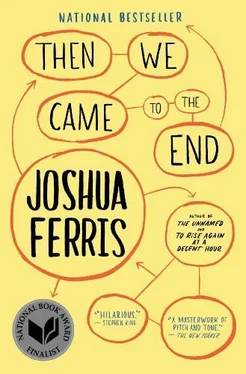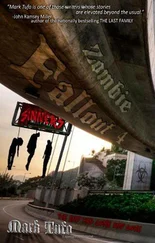When she entered, disrupting Chris Yop at his story, she was carrying input documents fresh from the copy machine; a scent of toner trailed behind her. Without a word she set the copies on her desk and began to collate them, moistening her finger and thumb and stapling the sheets together and passing the packet to Joe, who sat immediately to her right. “Stapler on the machine’s broken,” she explained. Joe passed the document to his right, and it wound its way to Karen Woo, who was seated farthest from him. Lynn stapled a few minutes more, then stopped to remove her leather heels. “Why does it feel like I just walked in on a funeral?” she asked, finally looking around at us. No one said a word. “I hope it’s nobody I know,” she added. She went back to collating and stapling.
Our information had come from reliable sources but it was only the barest details. Her surgery was scheduled for the following day. The tumor had invaded her chest wall. She was going in for a full mastectomy. We had questions for her — was she scared? did she like her doctors? what were her chances of complete recovery? But she had not yet said a word about it to any of us and we knew nothing of her state of mind. We might have wondered why she was at work the day before. She needed to get her priorities straight, we thought. But then none of us ever had our priorities straight. Each and every one of us harbored the illusion that the whole enterprise would go straight to hell without our individual daily contributions. So what was this fantasy about straight priorities, this dream that would never be realized? Besides, what else should she do but carry on? We had to think that by coming into work the day before surgery, she was refusing to let the specter of death distract her from the ordinariness of life that could very well be both a comfort and an armament to someone diagnosed with breast cancer. She was exactly right to come into work the day before. Unless she should have stayed at home and ordered in and played with her cats on the sofa. It was really not for us to say.
Without so much as a word about Chris Yop’s presence among us, the input documents got handed around. Everyone took a copy; Chris Yop took a copy, too. Did he really plan to sit through the entire input meeting though he was no longer an employee? Lynn took her jacket off and flung it over her chair, sat down, and said, “Okay. Let’s get this funeral started.” She began to read from the input document. When we turned the page, Yop turned the page. It was hard to concentrate on anything else. There was Lynn, reading from the input document, and then there was Yop reading from the input document, and the one had just fired the other, but there they both were, carrying on as if nothing at all had happened. Maybe she hadn’t noticed him? Maybe she had other things on her mind?
Our project turned out to be pro bono. The agency had donated our services to a popular breast cancer fund-raising event sponsored by the Alliance Against Breast Cancer. Our job, Lynn explained, reading from the input document, was to raise awareness of the event and to boost donations across the country. We would be doing so by advertising in nationally distributed magazines and on the backs of cereal boxes.
We had to wonder, was this just a bizarre coincidence? We thought she might finally say something to us about her diagnosis. We watched her, but she never wavered from her steady reading of the input document. She gave no indication that this project was different in any way from any other project. We looked around at one another. Then we looked back down at the input document. When she was through, she explained a few extraneous matters, and then she asked us if we had any questions. We told her it sounded like a great project, and we inquired how we happened to get involved. “Oh, I know the committee chair,” she replied. “I’ve been saying no for two years and I just didn’t have the energy to say no anymore.” She shrugged. Noticing something in the corner of her eye, she turned and picked lint off the shoulder of her blouse. “Any other questions?” No one said a word. “Okay,” she said. “Funeral’s over.” And with that, we all got up and left her office. Yop almost made it out into the hall when she called him back in. “Chris,” she said, “can I have a word with you, please? Joe,” she added, “get the door on your way out, will you?” Yop turned back, downcast and hesitant. Lynn got up to draw her blinds. Yop walked back in, the door closed, and that was the last we saw of them.
We set off for our offices and cubicles, immediately leaving them again to gather in small clusters, in doorways and print stations, to discuss the almost surreal pro bono project we had on our hands. During the input she had asked us to envision a loved one being diagnosed with the disease — a wife, a mother — so that we could really sympathize with cancer sufferers and design a more effective communication. Well, she had the disease. If someone could give us insight to sympathize with the sick for a more effective communication, who better than she? And yet not a word. Everyone knew she was a private person. And we had a reputation for gossip. We didn’t expect that she would just come out and announce that she had cancer. But she was also a very dedicated marketer, and in that respect, it was perhaps odd, despite her sense of privacy, that she did not extend herself to help us better understand the horror of a diagnosis, for example, or the misery of treatments, if understanding those things were necessary for coming up with a better ad. We didn’t know if we should believe that she just happened to know some committee chair who had pestered her and pestered her until she agreed to donate our time.
She had a command of business politics like no one we had ever known. In 1997 she quarreled with Roger Highnote. He departed, and our lives improved dramatically. She was an enemy of the lowest common denominator. The cardinal rule of advertising has always been, make your communication dumb enough for an eighth grader to understand. Lynn Mason’s mentor, the fabled Mary Wells, had the fabled Bernbach as mentor, and Bernbach once said, famously, “It’s true that there’s a twelve-year-old mentality in America. Every six-year-old has it.” Like Wells and Bernbach, Lynn respected American intelligence, and a lot of good had come from it: the talking llama campaign, the Cold Sore Guy spots. Sure, she was the one walking everyone Spanish down the hall, but she hadn’t walked any of us Spanish down the hall yet — that was an important distinction.
Lynn Mason was also scrupulous as hell. Once Karen Woo and Jim Jackers were redesigning the packaging for a box of cookies made by a big conglomerate who later broke our hearts when they left us for another agency. The box was standard stuff, overanimated with recognizable cookie characters and catchy little phrases like “Chocolicious!” and “Dunkable!” in colorful arching fonts. These mandatories had to stay; they had become scripture in the client’s thick red binder of branding guidelines. So Karen and Jim’s job was pretty simple — they were just being asked to find some way to play up the cookie’s nutritional value. In an increasingly health-conscious and weight-wary world, every cookie box was doing it. So Karen wrote some copy for one of the panels that spoke to the importance of niacin and folic acid. Then she went down to Jim’s cube and stood over his computer while instructing him to write, in a smallish font near the bottom of the front of the box, “0 g of Lastive Acid.” Jim did as he was instructed.
“What’s lastive acid?” he asked.
“Not something you want in your body,” replied Karen.
They took the box down to Lynn, who looked over the changes. Practically everything was the same except for the copy box on the side panel discussing the good effects of niacin and folic acid, and Lynn was happy with that until she came to the part that read — and here she stopped reading silently and began to recite out loud — “‘And our chocolicious cookies contain zero grams of lastive acid, making them the health-conscious choice for totally dunkable snacking.’ What is lastive acid?” she inquired.
Читать дальше












